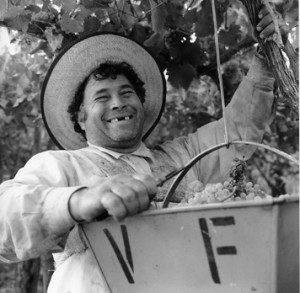What is Fairtrade wine?
February 26th, 2013 | Business
So why have I chosen this moment to write about Fairtrade wine? Well, it’s simply because as of yesterday we slid quietly (perhaps too quietly) into ‘Fairtrade fortnight’ – two weeks when the wine industry is required to focus its attention on ethically produced wines.
I think I should start by saying that to the best of my knowledge there is no such thing as Fairtrade wine here in Spain, and the reason for this is quite simply that we do not need it. Fairtrade products exist to ensure that the people who are making them (and possibly even more importantly, their employees), receive ‘fair’ remuneration for their products and their labour. As we live in a modern western democracy we would of course hope that Spanish companies and their workers are not subjected to the same economic pressures as some of our poorer third world cousins – hence the fact that Fairtrade does not really apply to us.
The worst affected countries are reported to be South Africa, Chile and Argentina where agricultural workers are notoriously badly paid. Even a recent 52% increase paid to workers in the South African vineyards means that they still only earn a meagre R105 per day (approx £7.50 or $11.50), which is probably still well below what we should consider to be ‘fair’. Obviously this is one of the reasons that wines from these countries are often so cheap, as labour alone accounts for a considerable chunk of the production cost of each bottle. The cheaper the grape production, the cheaper the liquid. Simple.
Of course in more modern production areas the vineyard costs have been reduced by the introduction of mechanisation, but this requires a considerable financial investment at the offset, and also means that perhaps the resulting fruit is not quite as good. There will be some who would argue that mechanisation in the vineyard makes little or no difference, but I believe that there are only a very few of the world’s very top producers who would support this idea. Usually the more care we take with our fruit, the better the end product, and I for one am certainly a believer that probably 95% of our quality comes from the vineyard (or perhaps even more!).
To close I am reminded of the story of a restaurant that advertised “food at popular prices”. One customer complained “but this food is expensive and your sign says food at popular prices”. The owner looked at him and replied dismissively “Yes, but we like them”….. perhaps the antipathy of Fairtrade?
So why have I chosen this moment to write about Fairtrade wine? Well, it’s simply because as of yesterday we slid quietly (perhaps too quietly) into ‘Fairtrade fortnight’ – two weeks when the wine industry is required to focus its attention on ethically produced wines.
I think I should start by saying that to the best of my knowledge there is no such thing as Fairtrade wine here in Spain, and the reason for this is quite simply that we do not need it. Fairtrade products exist to ensure that the people who are making them (and possibly even more importantly, their employees), receive ‘fair’ remuneration for their products and their labour. As we live in a modern western democracy we would of course hope that Spanish companies and their workers are not subjected to the same economic pressures as some of our poorer third world cousins – hence the fact that Fairtrade does not really apply to us.
The worst affected countries are reported to be South Africa, Chile and Argentina where agricultural workers are notoriously badly paid. Even a recent 52% increase paid to workers in the South African vineyards means that they still only earn a meagre R105 per day (approx £7.50 or $11.50), which is probably still well below what we should consider to be ‘fair’. Obviously this is one of the reasons that wines from these countries are often so cheap, as labour alone accounts for a considerable chunk of the production cost of each bottle. The cheaper the grape production, the cheaper the liquid. Simple.
Of course in more modern production areas the vineyard costs have been reduced by the introduction of mechanisation, but this requires a considerable financial investment at the offset, and also means that perhaps the resulting fruit is not quite as good. There will be some who would argue that mechanisation in the vineyard makes little or no difference, but I believe that there are only a very few of the world’s very top producers who would support this idea. Usually the more care we take with our fruit, the better the end product, and I for one am certainly a believer that probably 95% of our quality comes from the vineyard (or perhaps even more!).
To close I am reminded of the story of a restaurant that advertised “food at popular prices”. One customer complained “but this food is expensive and your sign says food at popular prices”. The owner looked at him and replied dismissively “Yes, but we like them”….. perhaps the antipathy of Fairtrade?



